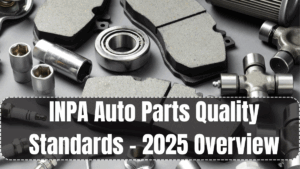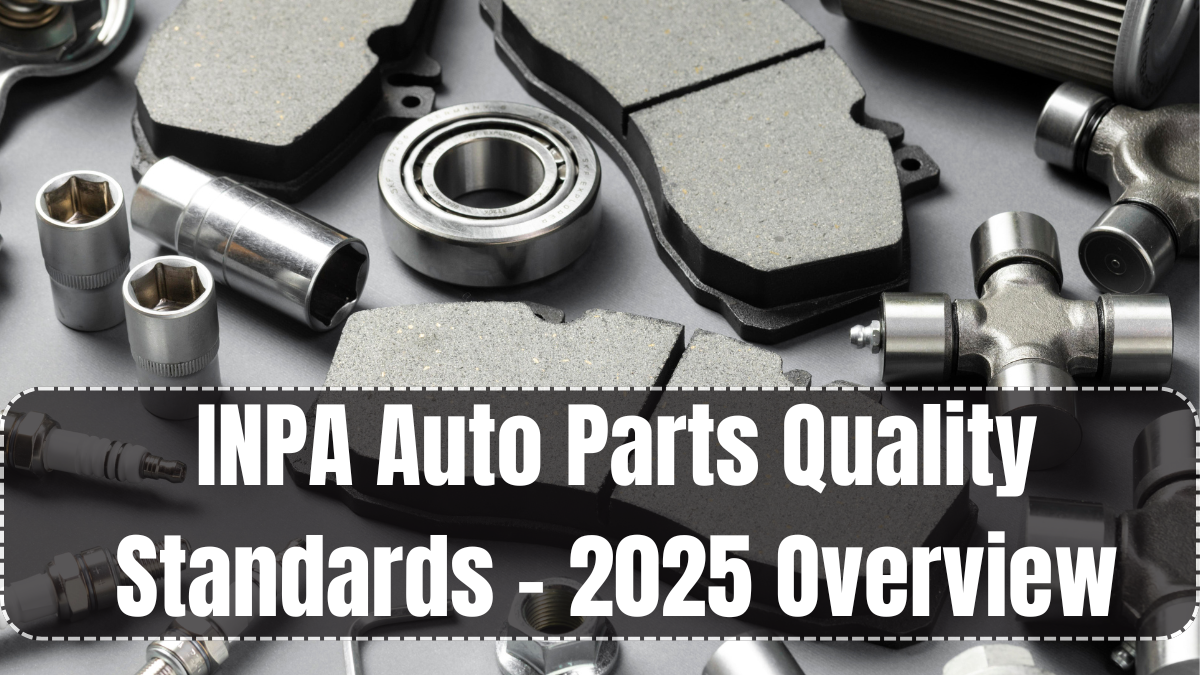As India’s automotive industry continues to expand, maintaining product quality and consistency has become more important than ever. The Auto Parts Quality Standards 2025, as revised and published by the Indian National Parts Authority (INPA), are designed to ensure that every automotive component—whether domestic or imported—meets a strict set of safety, durability, and performance benchmarks.
These updated standards are critical for automakers, OEM suppliers, garages, and spare part retailers alike. Whether it’s a brake pad, engine mount, or wiring harness, the 2025 standards aim to minimize failures, promote compatibility, and create a unified benchmark for both B2B and B2C segments.

What’s New in Auto Parts Quality Standards 2025
The INPA has introduced several improvements to the Auto Parts Quality Standards 2025 to reflect current market dynamics, EV developments, and road safety regulations.
Key updates include:
-
Mandatory QR code tracking for high-risk components
-
Standardized tensile strength testing for chassis and suspension parts
-
Revised heat resistance benchmarks for brake and clutch systems
-
Anti-counterfeit labels for imported electronics and sensors
-
New noise and vibration thresholds for engine components
-
Compatibility grading for aftermarket and OEM parts
These revisions not only enhance safety but also reduce warranty claims and the need for repeated repairs.
Components Covered Under 2025 Standards
The Auto Parts Quality Standards 2025 now include over 800 types of components across major categories. This includes parts for ICE vehicles, electric vehicles, hybrids, and commercial fleets.
Covered categories:
-
Engine parts: pistons, valves, oil filters, fuel injectors
-
Electrical parts: alternators, sensors, ECU chips, wiring looms
-
Suspension & steering: tie rods, bushes, dampers, arms
-
Braking systems: pads, rotors, calipers, cylinders
-
Body parts: bumpers, panels, headlights, mirrors
-
EV parts: battery connectors, cooling fans, inverters, BMS units
Every category is now linked to specific INPA codes for traceability and documentation.
Certification and Compliance Process
For manufacturers and suppliers to meet Auto Parts Quality Standards 2025, they must obtain certification from INPA-approved labs. This ensures that the parts are safe, compatible, and ready for both Indian and export markets.
Steps in the certification process:
-
Submit technical documentation and sample parts
-
Laboratory testing for durability, safety, and performance
-
Audit of manufacturing processes and sourcing
-
Issuance of INPA compliance certificate
-
QR code and tamper-proof label assignment
Once certified, manufacturers can legally affix the “INPA Approved” tag, which is mandatory for bulk supply to OEMs and government fleets.
Impact on Manufacturers and Retailers
The rollout of Auto Parts Quality Standards 2025 has introduced both challenges and opportunities for the Indian automotive supply chain.
Positive impacts:
-
Improved trust between OEMs and local suppliers
-
Streamlined supply chain through traceable components
-
Better export potential due to compliance with global norms
-
Reduction in fake and low-quality parts in the retail market
Challenges:
-
Higher compliance costs for small manufacturers
-
Need for investment in advanced testing labs
-
Training and certification for internal QC teams
To support MSMEs, INPA and SIDBI are jointly offering subsidized loans and training sessions for upgrading to the new compliance model.
Role of INPA in Quality Assurance
The Indian National Parts Authority (INPA) plays a pivotal role in ensuring that the Auto Parts Quality Standards 2025 are enforced across all vehicle segments. The agency collaborates with:
-
ARAI and ICAT for component testing
-
MoRTH for policy alignment
-
BIS (Bureau of Indian Standards) for labeling and certification
-
State RTOs for on-ground checks and enforcement
In 2025, INPA has also launched a centralized database where certified auto parts and their suppliers are listed, helping buyers verify authenticity before purchase.
FAQs
What is INPA?
INPA stands for Indian National Parts Authority, the regulatory body responsible for defining and enforcing automotive parts quality standards in India.
Which parts need to follow the 2025 standards?
Over 800 components including engine, electrical, suspension, braking, and EV parts must comply with the updated standards to be sold legally to OEMs and in certified workshops.
How can manufacturers get INPA certification?
Manufacturers must submit part samples and documentation, undergo lab testing, and receive approval from INPA or its authorized labs.
What is the penalty for non-compliance?
Non-compliant manufacturers and retailers may face product recalls, fines up to ₹5 lakhs, and blacklisting from OEM contracts.
Are these standards applicable to imported parts?
Yes, all imported parts must meet INPA’s quality checks, and labeling is mandatory before retail or installation.
Click here to know more.
